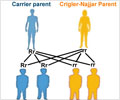US researchers have reported that genetic mutations increase the risk of preterm birth, after establishing a link between the mutations and inflammatory injury.
US researchers have reported that genetic mutations increase the risk of preterm birth, after establishing a link between the mutations in the Toll-like receptor 4 (TLR4) gene and inflammatory injury to the placenta and developing baby.
TLR4 enables the body to recognize pathogens and activate the immune system. This gene is expressed most abundantly in the placenta and in white blood cells.The study, led by Hyagriv Simhan, M.D., assistant professor of obstetrics, gynaecology and reproductive sciences at the University of Pittsburgh School of Medicine, indicates a possible genetic predisposition to a kind of misfire in immune system response that could contribute to placental inflammation and spontaneous preterm birth.
“These injuries are important because they are more common in preterm babies and associated with major health consequences like cerebral palsy,” Simhan said.
In the study the researchers analysed DNA from placental tissue samples and cord blood from 111 women and their babies and found that one maternal Single Nucleotide Polymorphism (SNP) in TLR4 (rs1079932) and one foetal SNP (rs1554973) demonstrated “highly significant association with chorionic plate inflammation,” irrespective of adjustment for maternal race, smoking and lower genital tract infection, all of which can contribute to genetic mutation.
Simhan noted that women with TLR4 mutation were 5.2 times more likely to exhibit inflammatory injury to placental tissue than those without the mutation. Babies with TLR4 mutation were nearly five times more likely to exhibit inflammatory placental injury than those without the mutation.
“Being aware of these genetic mutations may lead to better screening efforts,” Simhan said.
Advertisement
Source-ANI
SRM/M










